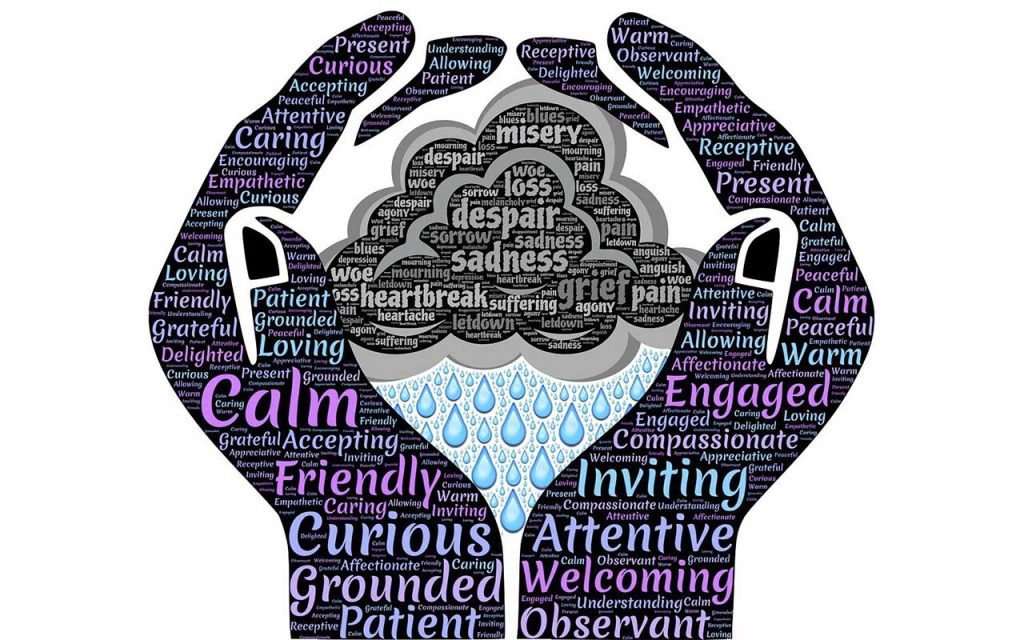
About 10 years ago, my whole world turned upside down. All the stable ground under my feet disappeared overnight. Like that magician deftly whipping a sheet out from under the china set. But this time, imagine instead that the table itself disappears.
Freefall…
The contemporary spiritual ashram and community where I worked, lived, and practiced fell apart. I was a full time resident at that ashram for 14 years – much of my adult life. It was the source of my livelihood, my community, and the spiritual path and practice to which I’d dedicated my life.
The reason for this conflagration?
Our Guru had intractable issues around power and control. Our student body fractured, frayed, and dissolved in the face of his unwillingness to relinquish any measure of leadership and control.
Confusion & Shock
It happened so fast. I was confused and in shock. Many of my peers were filled with righteous indignation and clarity of purpose, reassessing everything we had stood for. I, on the other hand, felt like it was all happening in a dream, just beyond reach or reason.
My wife and I moved from the bucolic Berkshires of Massachusetts to Boston. We found work and started to build a new life for ourselves.
It was all surreal. Like stepping out of one world with its own language and customs and geography into a new parallel world where much looked the same but everything felt foreign.
In many ways, we landed on our feet thanks in large part to friends and family. But after a year or two I started to notice something strange.
Seemingly random things would cause me to cry. A meme on social media. A commercial. A sports highlight. And I didn’t understand why. I didn’t get it. I was not a cryer. Honestly, I couldn’t remember the last time I cried.
But now I felt like a jar overfilled with water bursting the banks at the slightest bump. Once triggered, I would feel raw and exposed with tears leaking from the sides of my eyes, unable to give words or rationale to this rising inner tide.
One night I turned to my partner and said, “I think I need to talk to someone about this.” I had a vague sense that this was about everything that happened with our community.
Finding A Healer
I found a therapist and during our first session, after I recounted the story of our community’s collapse, she asked me to lie on the floor and close my eyes. She gently put her hand on my heart and something gave way.
The dam in my heart broke wide open. My body shook with silent sobs as the pain and heartbreak of loss moved through me like a late summer storm.
That day, I started to glimpse the healing power of tears. When I left my therapist’s office, I felt shaky on my legs and raw. My head was hazy and filled with cotton. At the same time, like the fresh air after a real thunderstorm, I felt cleansed.
I didn’t know it, but my body had been storing up grief for years until it finally started to overflow. The dissolution of my spiritual community was just the tipping point.
Understanding Grief
Over the next two years in therapy, I learned that grief, once you stop tamping it down, is indiscriminate. Once you open that door, everything is on the table. The buffet of traumatic events large and small laid bare. And you don’t get to decide what’s coming up from the depths.
But, I learned, you do get to decide how you want to relate to it all.
I learned that you can sit with it and let it pass through you or you can try to push it back down. I’ve chosen door number one. To trust the body’s innate intelligence and let the tears do their cleansing and healing work.
The Cleansing & Healing Power of Crying
Eight years later and I am now an avowed cryer. I never believed I would say this, but I love a good cry. It cleans me out and opens me up to myself and the world around me. It reminds me that I’m intimately connected to the pulse of life that flows through our miraculous garden planet and all its inhabitants.
It also connects me to the suffering of others. Not in a theoretical way. It’s now a felt reality that springs spontaneously from my heart center.
Fifteen years of intensive and unrelenting monastic training in the spiritual ashram didn’t awaken or truly connect me to the suffering of others…or even my own suffering.
Instead, I had to find a path through my own broken heart before I could start connecting to the suffering everywhere in the world around me.
Learning to traverse the terrain of the heart is learning that we have an incredibly sensitive spiritual, emotional, and somatic sense-making organ within. For my entire life, it’s been tracking, with meticulous precision, the wounds of separation, alienation, loss, abandonment, and injustice…trauma.
I spent the first 40 years of my life more or less disconnected from this spiritual organ. And when I look around at Western Culture, it appears to me that we’ve collectively lost touch with it as well.
An Epidemic of Self Criticism
Dr. Dan Brown, one of my previous teachers, was both a Vajrayana Meditation Master and a Harvard-trained clinical psychologist. He would say that in the West, we suffer from an epidemic of self-criticism.
You know what? I think there’s a pretty clear relationship between what Dr. Brown was saying and our alienation from the heart.
When I cry, I remember how incredibly important it is to be compassionate with myself. In fact, to be a decent and caring human, it’s probably the most important thing I can do. Why? Because I can’t deeply and authentically be compassionate with you if there’s no compassion in my heart for me.
A few years ago I would have nodded yes to that but inwardly raised an eyebrow thinking, “That sounds a little too precious to me and maybe a little narcissistic.”
But I understand now. That’s the voice that Dr. Brown was talking about. The culturally conditioned self that is caught up in a relentless and unwinnable race for achievement, perfection, and the next big thing. When my attention is there, the heart recedes into the background. There’s just no space for it.
Some Benefits of Crying
I won’t bore you with the reams of research that show how healthy it is for us to cry. You can look that up for yourself. But here are some of the ways that I benefit from a good cry.
- It reminds me to be kind and gentle with myself.
- My heart opens to the world around me.
- I’m relieved of burdens I’m not even aware that I’m carrying.
- It illuminates a palpable thread of heart connection between me and everyone else.
What Makes Me Cry?
You know what makes me cry more than anything else? Right now, it’s watching highlights from the Women’s World Cup.
Can you believe that?
Yep. I start crying as soon as the highlights begin! It’s hard crying too. Not soft. 😂 Maybe it’s hitting midlife and realizing that I’m not going to experience that kind of freedom and grace in my body ever again.
As an athlete growing up, sports were a powerful developmental vehicle for me and a window into the grace of the body. Now I have issues with chronic pain. I can’t do many of the activities that once brought me such deep joy.
But I also get the sense that it’s related to being a father of a little 7 year old girl.
Of course, she’s another trigger for big tears. The love there is just too much. And so is the wound – the innate wound that comes with that much love. So, on cue, movies or shows with young girls persevering against the odds make me cry as well.
And in case it’s not clear, I don’t judge any of this. My job is to let the tears flow and be available for whatever comes.
The Alchemy of Music + Meditation
I’m also midway through a multi year meditation teacher training program. And right now we are focused on the heart. One of the teachers is a therapist who uses music in the training to help us access the closed off compartments of our hearts.
Oh my goodness – it’s effective. Once during the training, she played a song that made me cry for 30 minutes straight. It just hit that spot.
So now I’ve integrated music into my daily meditation practice. It’s like adding spiritual and emotional rocket fuel. As a result, my daily practice has become a powerful vehicle and container for processing and attuning to this wounded heart we’re talking about.
You might be wondering, what exactly am I crying about in meditation?
Sometimes in practice the tears come unattached to any specific image, memory, event, or material in my consciousness. Other times, concrete memories emerge which help me move through specific wounds from the past.
Before this course, I didn’t think meditation could facilitate this level of deep “shadow work”. But now, it’s a reliable process that’s more or less happening on its own. And I couldn’t be more grateful.
Recently I was listening to a podcast on crying from NPR. During the show, they featured a neuropsychiatrist named Michael Trumbull who wrote the book Why Humans Like To Cry: Tragedy, Evolution and the Brain.
Professor Trumbull dropped a fact that surprised me. He said that human beings are the only creatures on Earth that cry emotion.
Creating Our Own Rites & Rituals for Healing
In the end, one thing is clear to me. Crying is healthy. It helps me surface and compost challenging and painful memories. It opens my heart. It connects me to my loved ones and to the broader community of life that I’m part of.
It helps me diffuse this colossal cultural momentum of self-criticism with steady heartfelt self-compassion.
I’m not saying that you should run out and get a bunch of sad movies and make yourself cry. Or that what’s right and healthy for me is good for you.
But I am suggesting that maybe you should give it a second thought and listen to your body if, like me, it is trying to tell you that there is work to do.
Our bodies have to cut through a lot of cultural distortion (internal and external) to get that message across.
And here’s the thing. It’s always a good time to heal. And there are very few places, spaces, rituals, and rites that help us to do that these days.
Why?
Because we’ve lost most of those communal functions (ceremony, ritual, etc) in the wake of modernity, so we have to (re)create them for ourselves.


